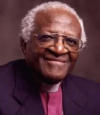| Quotations |
| The Connectivity of Justice: Desmond Tutu spoke at the Univ of Toronto
on Feb 15. He spoke of his Truth and Reconciliation Commission's approach
of "restorative justice": "We South Africans believe in
Ubuntu -- the essence of being human, that we are caught up in a delicate
network of interdependence. We say 'A person is a person through other
persons.'" |
|
"I have gifts that you do not have, so, consequently, I am unique.
You have gifts that I have, so you are unique. God has made us so that
we will need each other. We are made for a delicate network of interdependence."
|
|
"We are bound up in a delicate network of interdependence because,
as we say in our African idiom, a person is a person through other persons.
To dehumanize another inexorably means that one is dehumanized as well...
Thus to forgive is indeed the best form of self-interest since anger, resentment,
and revenge are corrosive of that summum bonnum, that greatest good, communal
harmony that enhances the humanity and personhood of all in the community."
... No Future without Forgiveness
|
|
"When the missionaries came to Africa they had the Bible and we had the
land. They said "Let us pray." We closed our eyes. When we opened
them we had the Bible and they had the land."
|
| "Just as those who have been capable of the most horrendous atrocities
turn out to be ordinary human beings like you and me, so too those who
have demonstrated noteworthy instances of the capacity to forgive could
easily be the man or woman living down the street. Wonderfully, forgiveness
and reconciliation are possible anywhere and everywhere and have indeed
been taking place, often unsung, unremarked." |
| "Children are a wonderful gift . . . They have an extraordinary capacity
to see into the heart of things and to expose sham and humbug for what
they are. " |



